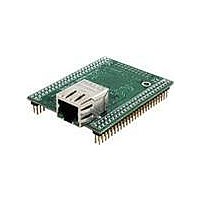MOD5234-100IR NetBurner Inc, MOD5234-100IR Datasheet - Page 220

MOD5234-100IR
Manufacturer Part Number
MOD5234-100IR
Description
MOD5234 10/100 ETHERNET MODULE
Manufacturer
NetBurner Inc
Type
Controllers & Processorsr
Datasheets
1.MOD5272-100IR.pdf
(3 pages)
2.MOD5234-100IR.pdf
(4 pages)
3.MOD5234-100IR.pdf
(754 pages)
Specifications of MOD5234-100IR
Interface
I²C, SPI, UART
Voltage - Supply
2.5V
Mounting Type
Surface Mount
Package / Case
Module
Product
Modules
Lead Free Status / RoHS Status
Lead free / RoHS Compliant
Data Format
-
Baud Rates
-
Lead Free Status / Rohs Status
Lead free / RoHS Compliant
Other names
Q4483564
- Current page: 220 of 754
- Download datasheet (13Mb)
System Control Module (SCM)
11.3.2 Arbitration Algorithms
There are two modes of arbitration: fixed and round-robin. This section discusses the differences
between them.
11.3.2.1 Round-Robin Mode
Round-robin arbitration is the default mode after reset. This scheme cycles through the sequence
of masters as specified by MPARK[Mn_PRTY] bits. Upon completion of a transfer, the master is
given the lowest priority and the priority for all other masters is increased by one.
If no masters are requesting, the arbitration unit must “park”, pointing at one of the masters. There
are two possibilities, park the arbitration unit on the last active master, or park pointing to the
highest priority master. Setting MPARK[PRK_LAST] causes the arbitration pointer to be parked
on the highest priority master. In round-robin mode, programming the timeout enable and lockout
bits MPARK[13,11:8] will have no effect on the arbitration.
11-10
• The master pointed to by the current arbitration pointer may get on the bus with zero latency
• If a requester will get an immediate address phase (that is, it is pointed to by the current
• There are two arbitration algorithms, fixed and round-robin. Fixed arbitration sets the
• The default priority is FEC (M3) > DMA (M2) > internal master (M1) > CPU (M0), where
• There are two actions for an idle arbitration cycle, either leave the current arbitration
• The anti-lock-out logic for the fixed priority scheme forces the arbitration algorithm to
if the address phase is available. All other requesters face at least a one cycle arbitration
pipeline delay in order to meet bus timing constraints on address phase hold.
arbitration pointer and the bus address phase is available), it will be the current bus master
and is ignored by arbitration. All remaining requesting ports are evaluated by the arbitration
algorithm to determine the next-state arbitration pointer.
next-state arbitration pointer to the highest priority requester. Round-robin arbitration sets
the next-state arbitration pointer to the highest priority requester (calculated by adding a
requester's fixed priority to the current bus master’s fixed priority and then taking this sum
modulo the number of possible bus masters).
M3 is the highest and M0 the lowest priority.
pointer as is or set it to the lowest priority requester.
round-robin if any requester has been held for longer than a specified cycle count.
next +1
next +2
next +3
MCF5235 Reference Manual, Rev. 2
M3 = 11 M2 =01 M1 = 10 M0 = 00
M3 = 00 M2 =10 M1 = 11 M0 = 01
M3 = 01 M2 =11 M1 = 00 M0 = 10
M3 = 10 M2 =00 M1 = 01 M0 = 11
Freescale Semiconductor
Related parts for MOD5234-100IR
Image
Part Number
Description
Manufacturer
Datasheet
Request
R

Part Number:
Description:
MCU, MPU & DSP Development Tools MOD5234 MODULE
Manufacturer:
NetBurner Inc
Datasheet:

Part Number:
Description:
MCU, MPU & DSP Development Tools MOD5234 Core Module Development Kit
Manufacturer:
NetBurner Inc
Datasheet:

Part Number:
Description:
BOARD SERIAL-ETHERNET 512K FLASH
Manufacturer:
NetBurner Inc
Datasheet:

Part Number:
Description:
PROCESSOR MODULE FLASH MOD5272
Manufacturer:
NetBurner Inc
Datasheet:

Part Number:
Description:
PROCESSOR MODULE 512KB FLASH
Manufacturer:
NetBurner Inc
Datasheet:

Part Number:
Description:
DUAL PORT SERIAL-ETHERNET
Manufacturer:
NetBurner Inc
Datasheet:

Part Number:
Description:
PROCESSOR MODULE FLASH
Manufacturer:
NetBurner Inc
Datasheet:

Part Number:
Description:
PROCESSOR MODULE 512KB FLASH
Manufacturer:
NetBurner Inc
Datasheet:

Part Number:
Description:
KIT DEVELOP NETWORK FOR MOD5282
Manufacturer:
NetBurner Inc
Datasheet:

Part Number:
Description:
KIT DEVELOP NETWORK FOR MOD5272
Manufacturer:
NetBurner Inc
Datasheet:

Part Number:
Description:
DUAL PORT SERIAL-ETHERNET
Manufacturer:
NetBurner Inc
Datasheet:

Part Number:
Description:
Ethernet Modules & Development Tools 32 Bit 66MHz 40 Pin DIP Industrial Temp
Manufacturer:
NetBurner Inc
Datasheet:

Part Number:
Description:
Ethernet ICs 32bit 147MHz CAN-to- Ethnt Device IndTemp
Manufacturer:
NetBurner Inc
Datasheet:










